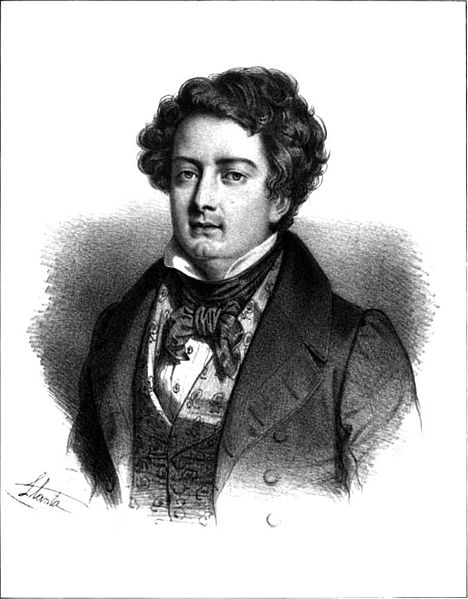Adolphe Nourrit
b
3 March 1802, Montpellier; d
8 March 1839, Naples
Considered the "first great
dramatic tenor" (Walker 2008, 411), Adolphe Nourrit was the son of
another great French tenor, Louis Nourrit (1780-1831). He studied
with Manuel del Pópulo
Vicente García for
18 months (Walker 1992) and sang the role of Noradin (created for
him) in the premiere of García's Florestan, ou Le conseil des dix on 26 June 1822. When his father
retired from the Paris Opéra in 1826, Adolphe Nourrit reigned as
principal tenor until he resigned in 1836. He created roles in
various Rossini operas, including that of Arnold in Guillaume Tell (1829), as well as important roles
in Meyerbeer operas: Robert in Robert le diable (1831)—a favorite of Chopin's—and
Raoul in Les Huguenots
(1836).
In 1837 Nourrit travelled to
Italy where he studied with Donizetti in Naples. His debut in
Mercadeante's Il giuramento
on 14 November 1838 was a success but Nourrit's voice and health
(both mental and physical) began to decline seriously. After a
concert on 7 March 1839 he thought the audience's warm reception
was intended to mock him. In despair, he committed suicide the
following morning by jumping from his window in the Hotel Barbaia
in Naples. Back in Paris, his friend, the guitarist Trinidad Huerta, honored him in a musical elegy for
voice and piano:
Mélodie
à la Mémoire
d'Adolphe Nourrit
Nourrit
n'est
plus.
Nourrit is no more.
Versez, versez des
larmes,
Let tears flow,
Aux souvenir d'un talent si
précieux;
To the memory of such a precious
talent.
Car il avait dans la voix tant
de charmes, For he
had so much charm in his voice,
Qu'en l'écoutant on se croyait
aux cieux. That upon
hearing it, one felt as if in heaven.
Pleurez, pleurez filles de
l'harmonie!
Weep, oh weep, daughters of
harmony!
Ils ont cessé les chants
mélodieux;
The melodious songs
have ceased.
Nourrit n'est plus: l'artiste
de génie
Nourrit is no more: the artist of
genius
Quitte la terre et regagne les
cieux.
has left earth and entered into heaven.
Listen to Huerta's "Mélodie à la
Mémoire d'Adolphe Nourrit," sung by Teresa Radomski.
Bibliography
Henry Pleasants, The Great Tenor
Tragedy: The last Days of Adolphe Nourrit as told (mostly) by
himself (Portland,
Oregon: Amadeus Press, 1995). A valuable collection of letters in
translation.
Evan Walker, Adolphe
Nourrit, (doctoral
dissertation, Peabody Institute, 1989).
Evan Walker, "Adolphe Nourrit," in The New Grove Dictionary of Opera (London:
Macmillan, 1992) vol. 3, pp. 625-626.
Evan Walker, "The Fable
of Adolphe Nourrit," Journal of Singing, (March/April 2008) vol. 64, No. 4,
pp. 411-416. Explores the nature of Nourrit's voice.
[Return
to Homepage]
